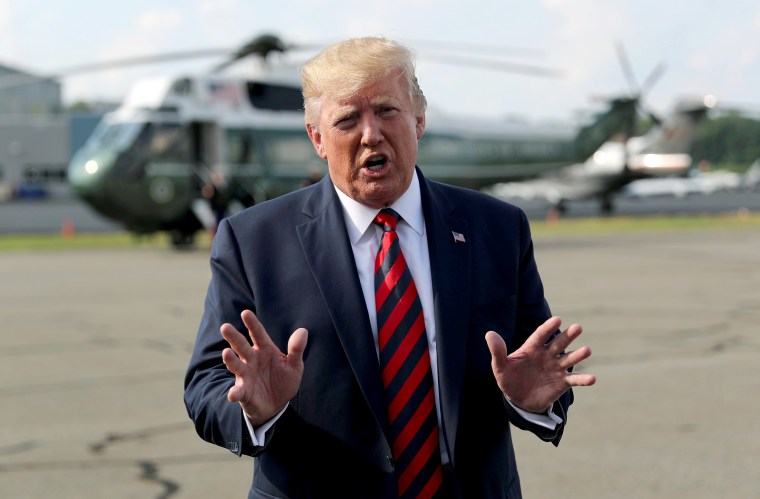WASHINGTON — President Donald Trump said on Tuesday he was weighing a payroll tax cut — an idea his advisers had insisted was not under consideration, given its potential to signal administration concern about a weakening economy. "It is something that I'm thinking about," he told reporters at the White House.
Moments later, he seemed to dismiss the idea that the economy would have any need for that dramatic an emergency measure. "We’re very far from a recession," he said.
Trump sought for a seventh day Tuesday to calm fears about the economy, brushing off talk of a recession and defending his decision to take on China, as real anxiety mounted inside the White House over how to end a trade war that risks dragging the U.S. into a recession during an election year.
The president showed little indication of lightening up on his standoff with China, even at the expense of hurting the U.S. in the short term. He blamed his predecessors for not having addressed China's unfair economic practices and leaving it to him, and once again attributed a cooling in the economy to the Federal Reserve.
"Someone has to take China on," Trump told reporters during a meeting with the Romanian president. "Whether it is good or bad for our country short term, it is bad for our country long term. Whether good or bad short term is irrelevant."
But despite Trump's public reassurances on the economy and resolve on China, inside the White House there was growing acknowledgement that the trade war with China risked dragging down the U.S. economy.
While reaching a deal with Beijing was always seen as important for Trump’s 2020 chances, the warning signs flashing on the economy and an 800-point tumble in the Dow last week have given advisers a jolt, White House aides said.
Trump's advisers have told him to focus his message on the signs of strength in the economy, like low unemployment, and avoid tying his success to the stock market, which the president has publicly used as an EKG of his presidency, according to people familiar with the discussions.
Meanwhile, the White House has sent out a full-court press of surrogates to push back against warnings from economists that a recession is looming, as the president himself sent out a flurry of retweets echoing the message Tuesday morning.
"Sorry to disappoint Democrats, but the economy has never been stronger!" said Trump campaign manager Brad Parscale in a message retweeted by the president that accused news organizations of "cheering for the economy to tank." Trump later retweeted a supporter who said he "has this Economy humming like a fine tuned engine."
Trump’s advisers have been divided on how hard to push China on a deal, said people familiar with the talks. Treasury Secretary Steve Mnuchin, whose main focus has been on the stock market and short-term economic indicators, has been a proponent of reaching some kind of agreement while Secretary of State Mike Pompeo and national security adviser John Bolton have taken a harder line on China, seeing the global security risk the country poses.
Vice President Mike Pence, who has pushed for a deal to include human rights concessions, increasingly sees a need for a deal, said one White House aide. Pence is the main point person in the administration for those in agriculture states, where farmers are being badly hurt by the trade war.
That division has contributed to the White House sending mixed signals on how badly the U.S. wants a deal.
Trump said last week he would delay $156 billion in tariffs because he didn’t want to hurt U.S. consumers during the holiday shopping season, while allowing an additional $100 billion in tariffs to go forward next month. He has also put off making a decision on whether to grant Chinese technology giant Huawei Technologies, which he has described as a national security risk, a 90-day extension to buy parts from its U.S. suppliers.
Now there is the risk that economic fears in the U.S. could give China greater leverage in negotiations — warnings that if the U.S. doesn’t lift the tariffs China will continue to retaliate through the election. China has already put retaliatory tariffs in place and earlier this month stopped buying U.S. agriculture products.
Trump has to walk a political fine line on China — and not just because of the economy, said one White House aide. He has repeatedly vilified the country to his base of supporters, blaming it for the loss of manufacturing jobs, and recent protests in Hong Kong has highlighted China’s human rights abuses. If Trump is seen as making a deal just for the sake of ending the trade war without getting significant concessions from China, he could be seen as going soft on Beijing.
“President Trump’s base, and many other Americans, have long been uncomfortable with China's growing power,” Christopher Wilson, a Republican pollster with WPA Intelligence, said in an email. “Events like the Hong Kong protests, especially if they end in the seemingly inevitable crackdown by the Chinese, will only strengthen Americans’ distrust of China. So continuing to take a hard line and not agreeing to a deal just to make a deal is probably an electoral benefit for the president.”
Pence warned China that it would hurt trade talks if protests in Hong Kong weren’t resolved peacefully, adding another layer to the complexity of striking a deal.
“We don’t want China’s markets to suffer," Pence said in a speech Monday in Detroit. "In fact, we want them to thrive. President Trump has a positive relationship with President Xi, and we have great respect for the Chinese people. We're in the midst of discussions with China, and they'll continue in the weeks ahead.”
“But for the United States to make a deal with China, Beijing needs to honor its commitments,” he added.

